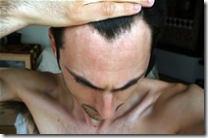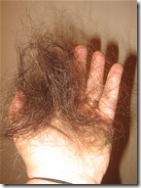3 Basic Reasons for Hair Loss
 Excessive hair loss is a physiological phenomenon which can be caused by a number of different factors. Under normal circumstances, we all lose some hair, which is known as “hair fall”. On average, 50 to 150 hairs are lost daily, which is compensated by the growth of the same number of new hairs. However, when shedding significantly exceeds growth, we can talk about excessive, or pathological, hair loss, which can eventually cause partial or even complete baldness.
Excessive hair loss is a physiological phenomenon which can be caused by a number of different factors. Under normal circumstances, we all lose some hair, which is known as “hair fall”. On average, 50 to 150 hairs are lost daily, which is compensated by the growth of the same number of new hairs. However, when shedding significantly exceeds growth, we can talk about excessive, or pathological, hair loss, which can eventually cause partial or even complete baldness.
What are the basic reasons for losing hair? Although opinions differ among medical specialists, most of the cases of excessive hair lost are caused by the following factors:
1. Hormones and genes.
Majority of hair loss cases, especially so-called “male pattern baldness”, are caused by a combination of hormones and “balding genes”. The potent hormone “DHT” (a derivation of testosterone) is responsible for hair loss in those people who also have a genetic predisposition for baldness. DHT- imposed baldness usually occurs only on certain parts of the scalp - on the crown and on top of the head, this is why many balding men have a horseshoe-shaped fringe of hair around the bald area.
Both underactive and hyperactive thyroid hormone can cause graduate hair loss in both men and women. If you experience hair loss together with other suspicious symptoms, like fatigue, cold hands, weight gain and edema, you might have a thyroid disease, which can be diagnosed by your doctor. In this case, hair loss is perfectly reversible and can be treated by prescribed medication.
Imbalances between the levels of estrogen and progesterone are responsible for many hormonally-influenced cases of hair loss in women. Unlike men, women tend to lose hair without any particular pattern. After childbirth, many women experience a temporary hair loss, which is caused by hormonal changes that take place during the after-birth recovery period - the so-called “telogen phase”. This can last up to six months, and in most cases the lost hair grows back. Also, in women with genetic predisposition, hair loss can be influenced by hormonal changes due to taking birth control pills. In case a woman has a family history of female pattern hair loss, she should be very careful with birth control pills, because the hormonally-induced alopecia (hair loss) sometimes cannot be reversed even after discontinuation of the pill.
2. Nutritional factors.
Hair shaft is made of protein called keratin. Protein malnutrition and deficiency of essential fats in the diet can be a cause for hair thinning and hair loss. Many women who want to lose weight and therefore restrict their intake of calories, protein and fats, do not get enough of valuable nutrients. The same is true about many women-vegetarians. If the intake of protein is not sufficient, the body enters into a “saving mode”, i.e. slows down the metabolism and sheds off hair in order to save valuable protein for more important physiological functions. In most cases, this condition can be reversed by eating nutrient-dense foods emphasising meats, dairy products, and fat-soluble vitamins contained in marine oils, butter, and other animal fats.
Iron deficiency, which in many cases is also caused by inadequate nutrition and often occurs in women with heavy menstrual periods, is another dietary - induced reason for hair loss. Low iron can be diagnosed in a doctor’s office and can be corrected by a good diet emphasising organic organ meats and other iron-rich foods.
3. Skin diseases and other illnesses.
 Hair follicles are extremely sensitive to any imbalances in the body. The conditions like an infection, high fever, or flu can lead to a hair loss, which is usually temporary and completely resolves when the body recovers. In case of chronic skin diseases which affect the scalp, like seborrhea, seborrheic dermatitis, or psoriases, the prognosis is not as optimistic - the hair usually thins and resists successful treatment. Alopecia areata, a disease of the immune system, produces coin-sized bold areas on the head or even may cause a complete hair loss (the condition called “alopecia totalis”). Stress is responsible for many cases of seemingly unexplainable hair loss. Hair can start falling about 3 months after a stressful event. Unfortunately, stress-induced hair lost often resists successful treatment.
Hair follicles are extremely sensitive to any imbalances in the body. The conditions like an infection, high fever, or flu can lead to a hair loss, which is usually temporary and completely resolves when the body recovers. In case of chronic skin diseases which affect the scalp, like seborrhea, seborrheic dermatitis, or psoriases, the prognosis is not as optimistic - the hair usually thins and resists successful treatment. Alopecia areata, a disease of the immune system, produces coin-sized bold areas on the head or even may cause a complete hair loss (the condition called “alopecia totalis”). Stress is responsible for many cases of seemingly unexplainable hair loss. Hair can start falling about 3 months after a stressful event. Unfortunately, stress-induced hair lost often resists successful treatment.
Besides those three major reasons for hair loss, balding and hair thinning can also be caused by a number of other factors, among which we can mention ageing, mechanical damage, poisoning with toxic substances, radiation, and medications. Future publications on this site will keep you informed about the possible reasons for hair loss and the latest solutions to restore the health of your hair.
Robin Makris
Posted on August 28, 2007
Filed Under Hair Loss Reasons
Comments
Leave a Reply
